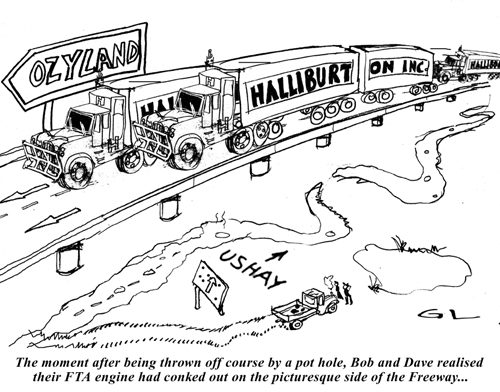Search
Recent comments
- needle terrorism
8 hours 30 min ago - Mossad link....
12 hours 29 min ago - giddy bibi....
13 hours 18 min ago - more to save....
18 hours 23 min ago - the MIC.....
20 hours 9 min ago - incredible....
20 hours 59 min ago - duplicitous....
21 hours 27 min ago - hedges....
22 hours 32 min ago - unfortunately NOT...
22 hours 53 min ago - hegemony....
23 hours 4 min ago
Democracy Links
Member's Off-site Blogs
Their bananas are wilting in the sun

- By Gus Leonisky at 5 Oct 2005 - 10:02am
- Gus Leonisky's blog
- Login or register to post comments
One way traffic....
From the SMH
Few knocks on US trade door
Very few Australian companies have taken advantage of business opportunities with United States government agencies that have been opened up by the Australia-US free trade agreement.
The agreement has been operational for more than nine months but, according to Washington management consultant Robert VanGorder, who has been in Australia this week talking to local companies about how they can enter lucrative US markets, there is little evidence of Australian businesses exploiting it.
The Trade Minister, Mark Vaile, said in January, when the agreement came into effect amid significant scepticism about the benefits to Australia, that it would create 30,000 new jobs and $57 billion in economic advantages.
Andrew Hudson, a trade lawyer with the firm Hunt and Hunt who organised Mr VanGorder's visit, said there was a risk with Australia negotiating so many free trade agreements that companies would experience "FTA fatigue".
Are we doing this here already?
From the Washington Post
FDA Is Urged to Ban Carbon-Monoxide-Treated Meat
Washington Post Staff Writer
Monday, February 20, 2006; Page A01
By Rick Weiss
Picture two steaks on a grocer's shelf, each hermetically sealed in clear plastic wrap. One is bright pink, rimmed with a crescent of pearly white fat. The other is brown, its fat the color of a smoker's teeth.
Which do you reach for?
The meat industry knows the answer, which is why it has quietly begun to spike meat packages with carbon monoxide.
The gas, harmless to health at the levels being used, gives meat a bright pink color that lasts weeks. The hope is that it will save the industry much of the $1 billion it says it loses annually from having to discount or discard meat that is reasonably fresh and perfectly safe but no longer pretty.
But the growing use of carbon monoxide as a "pigment fixative" is alarming consumer advocates and others who say it deceives shoppers who depend on color to help them avoid spoiled meat. Those critics are challenging the
Food and Drug Administration and the nation's powerful meat industry, saying the agency violated its own rules by allowing the practice without a formal evaluation of its impact on consumer safety.
someone always pay for free stuff...
Opposition Trade spokesperson Richard Marles, discussing the TPP and a free trade agreement with China on ABC Lateline recently, dropped the following claim:
“I tell you, there are hundreds of thousands of future Australian jobs at stake.”
Do you ever wonder where such claims come from and on what basis they are made?
Well, Lateline interviewer Tony Jones indicated that at least one of the sources politicians use is theProductivity Commission. But if we look – not even very carefully – at the Productivity Commission’s 2010 report on Bilateral and Regional Trade Agreements (BRTAs), we see evidence of serious misgivings concerning the claimed benefits of trade agreements (p 292) [IA emphasis]:
In brief, there are concerns that pre-agreement modelling is used to overstate the benefitslikely to be reaped from BRTAs, and that the assumptions and other qualifications surrounding the modelling tend to be downplayed in public statements by those promoting BRTAs (box 15.1). In the Commission’s assessment, this leads to unrealistic expectations about what will be obtained, and skews consideration of the merits of proceeding with negotiations.
In short, there are serious questions about many aspects of these models and their reliability.
Also, as the report suggests, politicians such as Richard Marles make public statements which completely ignore these questions.
Now, I am sorry to single out Richard in this criticism, as other politicians seem no better. Even well-prepared official party documents such as the Coalition’s Trade policy document include statements that are unverifiable and unsourced.
For example, the claim that:
Over the last 20 years, multilateral trade liberalisation has boosted real family incomes by between $2,700 and $3,900 per year.
So, the Australian public is expected to just accept that such claims are not only uncontroversial but are a sufficient summary of complex issues?
read more: http://www.independentaustralia.net/2013/politics/free-trade-agreements-and-their-questionable-benefits/
-----------------------------------------
Gus: the only complex issue is than any FREE TRADE AGREEMENT BETWEEN AN EARTHENWARE POT AND A STEEL VESSEL is NEVER going to be in favour of the clay pot.